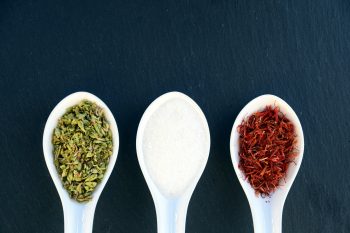Spice up Your Life! Herbs and Spices in French Posted by Josh Dougherty on Mar 25, 2018 in Vocabulary
It’s amazing how a little salt and pepper can enhance the flavor of a dish, but it’s generally a blend of other épices (spices; feminine) that bring a dish’s full flavor profile to the surface. Ces aromates (seasonings; masculine) can transport you to an exotic land, remind you of home-cooked meals from your childhood, or if it’s your thing, completely arracher la gueule (burn the roof of your mouth off; very familiar).
Some of the earliest known uses of spices for food date back to the time of les chasseurs-cueilleurs (hunters and gathers) when the hunters would wrap fresh meat in leaves and bushes for preservation but eventually discovering that these ‘herbs’ enhanced the flavor of the meat. As time went on, these tribes experimented with seeds, nuts, berries, and even tree bark, and before long, many of these items became in high demand because of their pleasant tastes and pleasing odors.
Spices would become a fundamental part of all the great civilizations; from the Egyptians to the Chinese to the smallest valleys in India, people couldn’t get enough. La route de la soie (The Silk Road), an ancient trade route connecting East and West, was established and played an essential role in the development of civilizations such as Korea, China, Turkish, Indian, Persia, Europe, and Arabia. Of course, much more than spices made this long journey, d’où le nom (hence the name), but the ‘spice gardens’ were certainly vital.
My first time really learning to cook came out of necessity. I was well fed at home (thanks, Mom!) and essentially spoiled in that I never had to do any preparation. When I was in college and spent a year in Angers, France, I was enjoying all the freedoms that came along with being alone – all of them except home-cooked meals. One of my friends there was an incredible cook and held masterclasses for me and my friends. In no time, we became comfortable in the kitchen, and our meals were quite flavorful. It was also around this time that I purchased spices for the first time. The closest supermarket to our dorms was a store that can be found all over France, Super U, and ce supermarché (this supermarket) had a huge selection of herbs and spices. It was here where I learned the majority of spice names in French, and we’re going to take a look at them today!
No longer will your food be fade (bland) or over salé (salted)! Bring out the natural flavors of your meats and vegetables.
les épices – spices
le sel – salt
le poivre – pepper
le piment – chilli pepper
le paprika – paprika
le poudre de curry – curry powder
le cumin – cumin
le curcuma – tumeric
le macis – mace
la noix de muscade – nutmeg
la cardamome – cardamom
le poivre de la Jamaïque – allspice
la vanille – vanille
la cannelle – cinnamon
le clou de girofle – cloves
la citronnelle – lemongrass
l’anis étoillé – star anise
la safran – saffron
le gingembre – ginger
les graines de fenouil – fennel seeds
les herbes – herbs
le persil – parsley
la menthe – mint
le thym – thyme
le basilic – basil
la sauge – sage
la ciboulette – chives
la coriandre – coriander
la marjolaine – marjoram
l’estragon – tarragon
l’origan – oregano
l’aneth – dill
le roumarin – rosemary
la feuille de laurier – bay leaf
le bouquet garni – bouquet garni

Build vocabulary, practice pronunciation, and more with Transparent Language Online. Available anytime, anywhere, on any device.





Comments:
Chris:
Josh – Just moved to Montpellier for a few months, and this is a timely post. Did you ever run into red pepper flakes? It’s a staple of mine in the States, but can’t find it at the local monprix. Any thoughts? There are obviously other ways to add heat to a dish, but still, this is my go to spice.